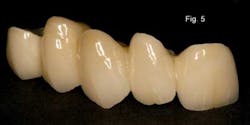Mosquito style communication
While sitting in a quiet reception room reading an article and waiting for your doctor's appointment, a woman walks up to you with no warning, extends her hand, and abruptly hits you on the arm. Your blood pressure rises as you become angry and confused. A mosquito had landed on your arm and the woman was simply trying to protect you from the pain and potential infection of a bite. How would you react to this scenario? Some people may become very angry at the well-intentioned woman. Here's another scenario. The woman approaches you and says, "There's a mosquito on your arm. Hold still!" Then she gently hits your arm. Is your reaction the same? Probably not. Most of us would be grateful to get rid of such an annoying pest! What was different in these two scenarios? What single action could have caused the first scenario to result in an angry patient, and the other to result in a thank you? The answer is COMMUNICATION. That's right, communication in the second scenario allowed you to understand what the woman was going to do, why she was going to do it, and give you the choice to refuse her help. As a dental assistant, would you rather position and expose a radiograph that you know may be painful or uncomfortable to the patient without communicating first, or would you prefer their active assistance in the procedure? Let me give you an example, "Mr. Smith, Dr. Ellis asked me to take a set of X-rays so that he can accurately diagnose any cavities or problems you might have. Now I know these X-rays are not very comfortable, but if you'll help me, I'll do my absolute best to make it as comfortable as possible, and we'll try to get a good picture the first time. That way we might not have to do this twice! Will you help me?” What patient is going to say, "No thanks, I'm not going to help you. Just take the X-rays, and if it hurts, fine! I'm tough and can handle the pain!”Yeah, right. None of my patients would ever say that! They're all eager to help in the exposure process to avoid excessive discomfort. Then even if their tissue is extremely sensitive, or they have unusual anatomy that requires uncomfortable positioning, the patient is not going to be mad at YOU. Instead of you and the X-ray challenging the patient, you have changed teams. With communication, you and the patient work as a team against the X-rays! If there is discomfort, patients will be more understanding than if you simply "take the X-ray" without explaining the process to them.Patients will leave with a positive impression of your office in their mind. They will probably feel that you really care about them because you took the time to explain the process and seemed like you were "on their side." They may even tell the office manager or administrator about their experiences. They may say something like, "Wow, when Mary took my X-rays, she was so kind. She explained the process to me, and she worked with me to make it easier. Next time when I come back, I want Mary to be my assistant.” Wouldn't you like to be the assistant all the patients request? How many times does your employer need to hear positive comments from patients about your chairside manner before he/she notices? It's amazing how simple yet important communication is in everything we do as professionals. Next time you take a radiograph, connect with your patients in a way that establishes a relationship of trust, teamwork, and genuine concern for their well-being. Remember the mosquito story and don't strike your patients with unexpected surprises!Author bioNiki Henson is the president of Cornerstone Dental Academy, where she authored the curriculum and provides continuing education to dentists, hygienists, and dental auxiliaries. She travels as a speaker and consultant, and presents a variety of seminars and clinical programs. Ms. Henson is a Registered Dental Assistant, a member of the American Dental Assistants Association, an approved provider for the Academy of General Dentistry through the PACE program, professional member of the National Speakers Association, member of the Speaking Consulting Network, a BLS CPR instructor, and is active in dental legislation. In 2005, Niki received the "Woman of Distinction" award from Success in the City for her ethics and commitment to dental education. She can be contacted at [email protected].
09RDH&54-%
